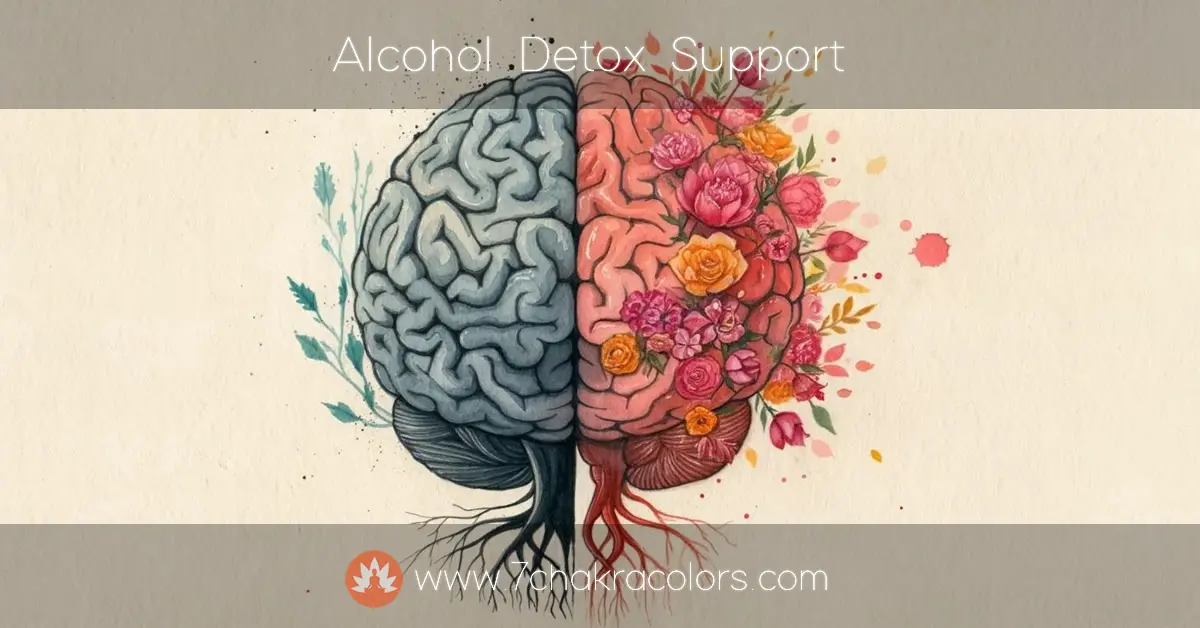

Discover holistic approaches to overcoming alcohol addiction through mindfulness, chakra healing, and meditation. Learn how detox programs and emotional balance support lasting recovery.
It is somewhat of a sketchy and taboo topic, but I feel I have to address this issue on my chakra site. Alcohol, detox, and chakras. I was thinking of presenting this topic for quite some time, but I was especially motivated to write this short article at this point because a rather young person I know just recently passed away due to years of alcohol and substance abuse. May his beautiful soul find eternal light.
Alcohol is a big blocker of energy flow and chakras.
People who want to clear their chakra blockages and improve their energy or do any kind of spiritual work, definitely have to stop drinking alcohol. In cases of serious addiction, detox is necessary.
Especially, I want to emphasize the importance of mental and emotional support during the detox process.

Detox is typically the first stage when an individual starts down the road to recovery from an alcohol use disorder. But for many, drinking is also just one portion of a whole, especially when one has one or more mental health issues in play.
One common question asked is whether mental health help is offered at accredited alcohol treatment programs.
Short Take: Yes, it’s standard to focus on mental health as part of addiction treatment, especially at programs that are accredited and follow stringent clinical protocols.
In the following piece from 7 Chakra Colors, we’ll look at how mental health is supported within accredited alcohol detox facilities, why accreditation is significant, and which populations, like young adults, may benefit from focused programs like those found in Arizona.
If you are a loved one, behavioral health professional, or someone who is thinking about seeking treatment, it’s important to know that this connection exists.
Detox is often the most physically intense phase of treatment, but it’s almost never a purely physical phenomenon. And for some people, the withdrawal symptoms aren’t only physical; they can be psychological, too: terrible anxiety, depression, irritability, and even hallucinations.
For some, a secondary or undiagnosed mental illness (such as PTSD, bipolar disorder, or generalized anxiety disorder) will surface when there is no longer any alcohol to cover the symptoms.
Accredited alcohol detox facilities know detox isn’t just about quitting alcohol; it’s about caring for an individual as a whole.

For many patients, having mental health care during detox can help them avoid relapse, maintain a more stable emotional state, and build a more solid foundation to continue in recovery. That’s why mental health care is not a separate program; it’s built into detox and treatment.
The phrase accredited alcohol treatment programs refers to programs that have been independently assessed and meet or exceed the current consensus-based standards for general alcohol use. (This recognition can be given by entities including The Joint Commission and CARF, which evaluate the quality, safety, and performance of care they provide.)
Dually diagnosed individuals are more likely to benefit from integrated dual diagnosis treatment—that is, treatment for both a substance use disorder and a mental health disorder (Daley & Moss, 2002; Institute of Medicine, 2006). This concept is clinically supported, in that people tend to do much better when both are treated in parallel.
They’re not certain at every center, but they are indicators of quality in centers that are accredited.
A large part of the world relies on alcohol to cope with mental health symptoms – whether it is anxiety, depression, trauma, or loneliness. Over time, the habit can become a dependence, or perhaps even an addiction. On the other hand, alcohol and drug abuse can make mental health problems worse, creating a maddening cycle that’s very hard to break without outside help.
This is why detox and rehab programs that deal only with substance use and ignore mental health concerns so often fail. People who detox alone and don’t receive help with underlying issues are more likely to relapse soon after leaving treatment.

Comprehensive licensed programs are designed to do so. They are staffed with clinicians who know the relationship between mental health and drug and alcohol use, and who can treat the whole person, not just his or her addiction symptoms.
In detox, mental health services almost always start with the assessment of the patient, where one can address both physical and psychological aspects. With the help of this evaluation, the clinical team then creates a treatment plan that can consist of:
Therapy during detox can sometimes be restricted, however, depending on the facility and how extreme the withdrawal is. Still, there is 24-hour emotional support and therapeutic monitoring through detox, followed by more therapy as the patient becomes more physically stable.
Other detox programs may include additional alternative therapies such as mindfulness-based stress reduction, art therapy, or yoga. These can be particularly good for someone with severe anxiety or depression in early recovery.
There are special issues involving young adults, mental health, and substance use. The brain continues to develop until the mid-twenties. Heavy alcohol use during this critical period of brain development can cause a cascade of negative effects on emotional and cognitive growth.
More universally, young adults everywhere are figuring out what they want from life, managing college experiences, jobs, relationships, and love lives—all while trying to work around their mental health.
Some detox programs for young adults in Arizona offer treatments such as mindfulness-based stress reduction, art therapy, or yoga, which can serve people dealing with anxiety or depression in early recovery especially well.
Young adults might wrestle with mood disorders, trauma, the strains of living with ADHD, or social anxiety that either precipitated their use or developed along with it.
Treatment efforts aim to help patients learn skills of emotional regulation, tolerance, resilience, and healthier coping, in addition to addressing the psychobiological components of alcohol dependence.
Options such as these services may offer a pathway for young adults to move through adolescence into early adulthood and toward recovery, with help to establish stable mental and emotional well-being.
You don’t need a diagnosis to receive mental health help in detox. Many individuals who present for alcohol treatment may have never been screened for depression, anxiety, or trauma-related symptoms. Others may simply be experiencing emotional upheaval, which detox and withdrawal can certainly exacerbate.
Accredited alcohol treatment programs have the capacity to help people where they are. One of the great things about these programs is that they treat every patient as an individual. If you have not had mental health problems before, professionals will still monitor your well-being and provide extra help if needed.
Symptoms of mental health disorders can sometimes be delayed and not show up until after a person has already begun detox. That’s where a good multidisciplinary team of providers can be pivotal, directing your care when new information arises.
True healing involves attention to many sides of a person’s life: mental health, physical health, relationships, work, identity, and purpose. Programs that divide those components—addressing addiction in one silo and mental health in another—can miss the complexity of recovery.

Certified alcohol rehab programs are based on cooperation. From detox and throughout the outpatient process, it’s understood that mental health is an integral part of recovery.
Especially for young adults, an integrated approach like this can be life-altering. Indeed, young adult programs in Arizona, for example, tend to look long-term, focusing not only on short-term sobriety but also on long-term mental and emotional growth.
It’s no secret that alcohol affects mental health, and contemporary alcohol detox centers have started to model themselves with this in mind.
These programs allow patients to heal in body, mind, and spirit by ensuring they receive a full continuum of integrated care from the very beginning.
If you’re in need of treatment for yourself or a loved one, look for accredited alcohol treatment programs that centralize mental health in detox and recovery. And if you are a young adult or care for one, look for tailored young adult programs in Arizona or elsewhere that address the special issues of transitioning to adulthood.
Recovery isn’t just about abstaining from alcohol. It’s also about rebuilding your life with the mental and emotional tools to stay well over the long term.
I hope that this short article has brought this reality before your eyes: at the end of the day, when it comes to mental well-being, support is not a luxury; it is a necessity.
Yes. Alcohol is often described as a major blocker of energy flow through the chakras. It can cloud perception, lower vibration, and prevent energy from moving freely. Many spiritual practitioners consider alcohol a direct obstacle to chakra healing, meditation, and spiritual growth.
Alcohol tends to disrupt multiple chakras at once, but it most strongly affects the Solar Plexus Chakra (personal power, confidence), the Heart Chakra (emotional balance and relationships), and the Third Eye Chakra (clarity and intuition). Excessive drinking weakens willpower, clouds emotions, and disconnects individuals from higher awareness.
The Root Chakra, which governs stability and grounding, can be destabilized by alcohol. While drinking may give a temporary feeling of relaxation, it ultimately erodes true safety and balance, leading to anxiety, instability, and even physical health issues.
Yes. Detox and long-term sobriety allow the energy system to recover. With support such as meditation, breathwork, chakra healing, and emotional therapy, blocked chakras can gradually reopen. Many people report clearer intuition, more emotional balance, and stronger life purpose after giving up alcohol.
Some accredited alcohol detox centers incorporate holistic practices such as yoga, meditation, mindfulness, and energy healing. While not every center specifically mentions chakras, many include therapies that indirectly support chakra balancing by promoting relaxation, self-awareness, and emotional healing.
Detox is not just a physical process. Alcohol withdrawal often triggers intense psychological symptoms such as anxiety, depression, or mood swings. Accredited detox centers include mental health support—such as therapy, counseling, and psychiatric care—to help patients stabilize emotionally and avoid relapse.
Yes. Healing chakras during alcohol recovery is possible and often very effective. Practices like guided meditation, mindfulness, yoga, and energy healing can be integrated with clinical treatment. Addressing both the mind and the energy body creates a more holistic path to sobriety and lasting wellness.